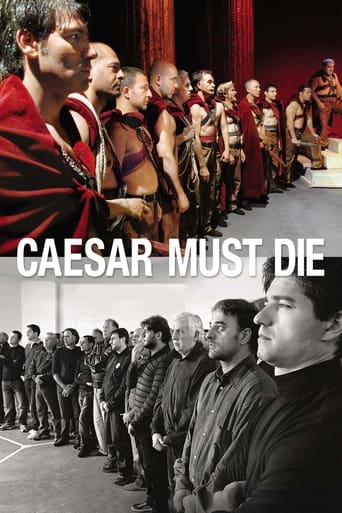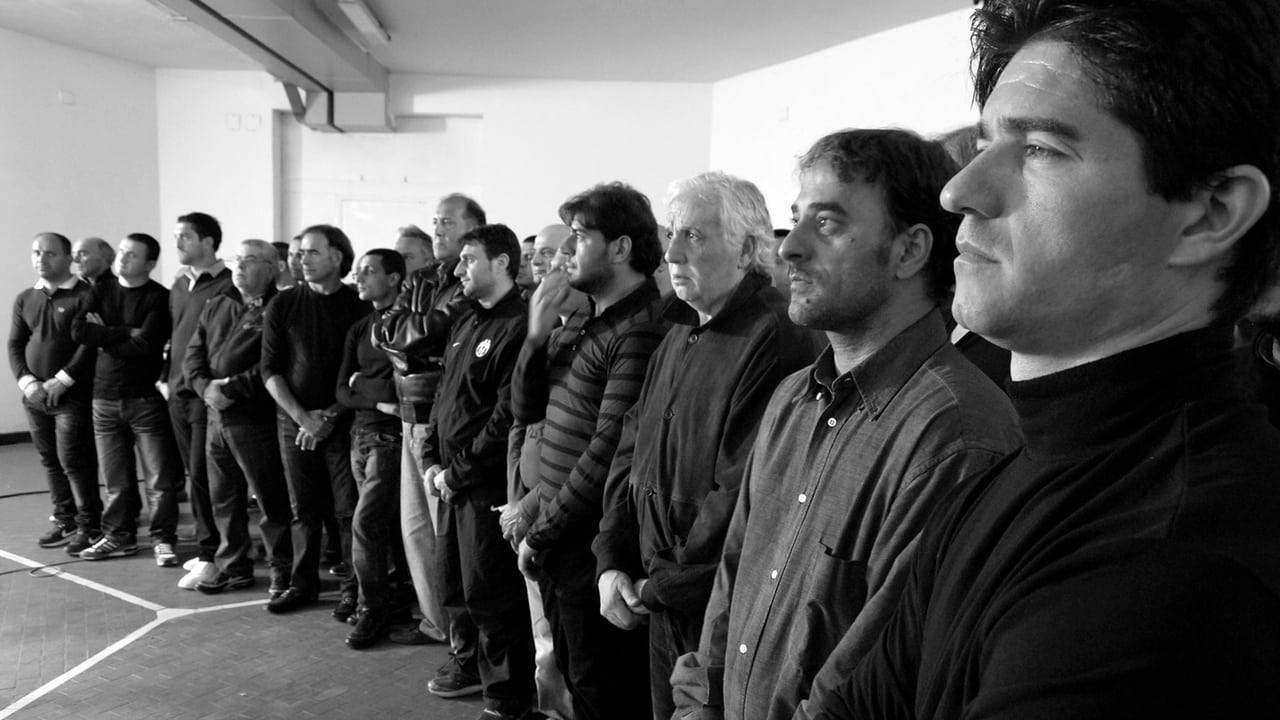dromasca
The Shakespearean 'All the world's a stage' gets a new meaning with this very interesting and very different film made by the Taviani brother whose actors and heroes are individuals for which the world is the high security prison where many of them are to spend long years paying for serious crimes. Using theater as a mean of therapy end education happens in some of these prisons, now a film not only dares to make this process known and visible outside the perimeter of the prison, but also tries to make of it a work of art. The Golden Bear at the Film Festival in Berlin is a proof that the Taviani brothers succeeded to convince at least the critics and members of the jury. I get the feeling that the larger public was less convinced - it's a very interesting piece of cinema, but not one of these that attracts audiences in numbers. This is not entertainment.In one of the introductory scenes we see a screen test. The actors-to-be are asked to introduce themselves in two situations - a 'soft' family one, and a second which demands them to feel constrained and express rage. Each of them acts with a mix of sincerity and intensity that much exceeds and compensates their lack of professionalism. This is the key of the film. We have already seen theater in theater (Shakespeare himself is the first and maybe greatest master of the genre) and theater about prisons, and many of these were already brought to screen. What we have never seen before is the mix of situations which makes the walls of the prison disappear for the ephemeral moments when the words of the ancient drama become the reality of life for the prisoners acting it.The film asks many questions which arise after the screening ends. Julius Caesar is a play about values - honor, democracy, freedom. How do the prisoners relate to these? The characters of the play are cruel in modern terms, the plot is also about treason and murder - how do these men who have committed serious crimes relate to these deeds? Some of the most interesting moments in the play (and there are only a few of them) are these in which real life (which for the actors is life in prison) interferes in the scenes of the play. I found the smooth, sometimes unobserved, sliding of life in a 21st century prison into the political drama that took place in the first century BC to be terrifying.And then we have the ending. The show is over, it ends in applause and ovations. Then the actors get back to what is their 'home' - the prison where most of them still have to spend many years. What we do understand is that life cannot go on without such a film changing it. The lives of the special actors in this movie, but to some extent the lives of the spectators as well.
sandover
The film struck a queer tone that was hard to pin down at first: modest but deceptively so, economic in its time and almost elliptic but yet not quite so, with chunks of life jumping into the rehearsals in an amateur, tongue in cheek, failed way - was this the point? What were the directors trying to do with this film? For as a paradigm of condemning power or exposing with the jarring effect art has the discontents of power this does not work.So what to do with this film? I think the Taviani bros knowingly or not took Six Characters in Search of an Author and turned it into some kind of Six Sentenced Men in Search of an Other, taking Pirandello's theatricality and sophistry and by pushing it to the extreme, to an alienating, subversive context, this would turn the black glove inside out stark white like in the superb cinematography. It is as if Pirandello and Brecht meet: we have the right amount of what was once called 'alienation' and the Pirandellian both sides of the argument, but this is unworkable. It makes irony or simplicity forced and in the very end the "discovery of art that turns the room into a prison" makes for sloppy humanism instead of pungent, elusive and political irony. In a perpetual state of emergency, when remembering the pure, ideological category of - ah! - life before, or after, or now, this turns you into a bad actor and not simply an amateur one as the film showcases.
dario_malic
"Cesare deve morire" ("Caesar Must Die") is the latest movie from brothers Paolo and Vittorio Taviani, experienced (both over 80 years old) Italian directors and screenwriters. In February 2012 it won the Golden Bear, the main prize of the Berlin International Film Festival, and a very strong reception from the audience which seems to continue. So what's it about? Some time ago a friend told the Taviani brothers about the great experience she had watching a play in a small theatre in Rome and so they went to visit it. They went there, loved the actors, and decided to film them creating another play, Shakespeare's "Julius Caesar". All of that doesn't sound like something special but there's a catch. The theatre is in fact in Rebibbia, a high-security prison, and all of the actors are convicts sentenced for various crimes and to a various amount of time (some even for life). That's the most peculiar but also the most problematic thing about this movie.The movie establishes three levels: one on the scene, the enacting of play, and two in the prison, prisoners as what should be their normal selves talking about the play and in their roles rehearsing for the play. The interesting thing is that on all of the levels the movie feels scripted. The moments of rehearsing are, with the help of camera work, editing and music, made to look like they are parts of play itself, whilst the situations when the prisoners are out of character see them still acting ,thus ironically making the actual play on the stage the only nonfictional part of the movie. As you can imagine, it all leaves you a little confused. Of course, it's questionable if the directors even wanted to create everything in that way. Maybe I'm just reading too much into it. But "Cesare deve morire" obviously tackles the theme of the theater-reality relationship and the fact that it's a movie undeniably adds to the equation.What the Taviani brothers pointed as their main intention in doing this movie is drawing the viewers' attention to the human side of the prisoners, and I'm not sure if they succeeded in that. That they in fact worked with amateur actors didn't help. As I've already said, the prisoners seem to act all the time thus denying us any real emotion and depriving us of any empathy. What we can assume is the usefulness of creating the prison theatre group. Both as a useful way for convicts to spend their time and as means to enable their interaction with the outside world. Bearing that in mind, the movie becomes useful as a sort of advertisement reaching to a broader audience.Being the advertisement of course isn't enough to be a good movie, however good the cause it advertises may be. Fortunately, there are a few more good things about it. Most of the movie is shot in black and white and the cinematography, done by Simone Zampagni, is beautiful. The use of the camera transforms prison cells to Roman houses and makes simple courtyards become the Senate and the grand Forum of the Eternal City. It successfully embodies "less is more" principle. The music composed by Giuliano Taviani and Carmelo Travia in the beginning feels mismatched, but when you recognize the rehearsals as the play and the other levels accordingly it clicks in emphasizing the pathos of the tragedy."Cesare deve morire" isn't a movie without its charms. I just feel like the directors didn't successfully accomplish what they were trying to, even if in the process they created something interesting (deliberately or not). That said, it puzzles me why it got the Golden Bear and I can't wait to see some of the other movies from the competition.More reviews at http://onlineimpressions.blogspot.com/
cblittle
Perhaps its the beautiful rolling sound of the Italian dialogue telling the story of Julius Cesar that made this enjoyable at least to the auditory sense. Perhaps it was that the language was sometimes amended to be more modern and meaningful. Perhaps it was the explained parallels of some of the prisoners experiences that helped to make the context more understandable. No matter, it was a thoroughly great way to start the Sydney Film Festival. The fact that this was a script within a script set in a prison using some real life prisoners didn't detract from anything in this film for me - I go to the cinema generally looking for a story, a fabrication, an unreality dressed in reality. I liked the gritty black and white, the sub-line of the prison life and setting. Yes, perhaps a prisoner saying he now felt caged etc didn't have to be said because it was obvious, but all in all a very enjoyable watch. I was engaged and participating from beginning to end. For me, one of the better versions of Julius/Shakespeare and a nice twist on an old but everlasting story.


 AD
AD

